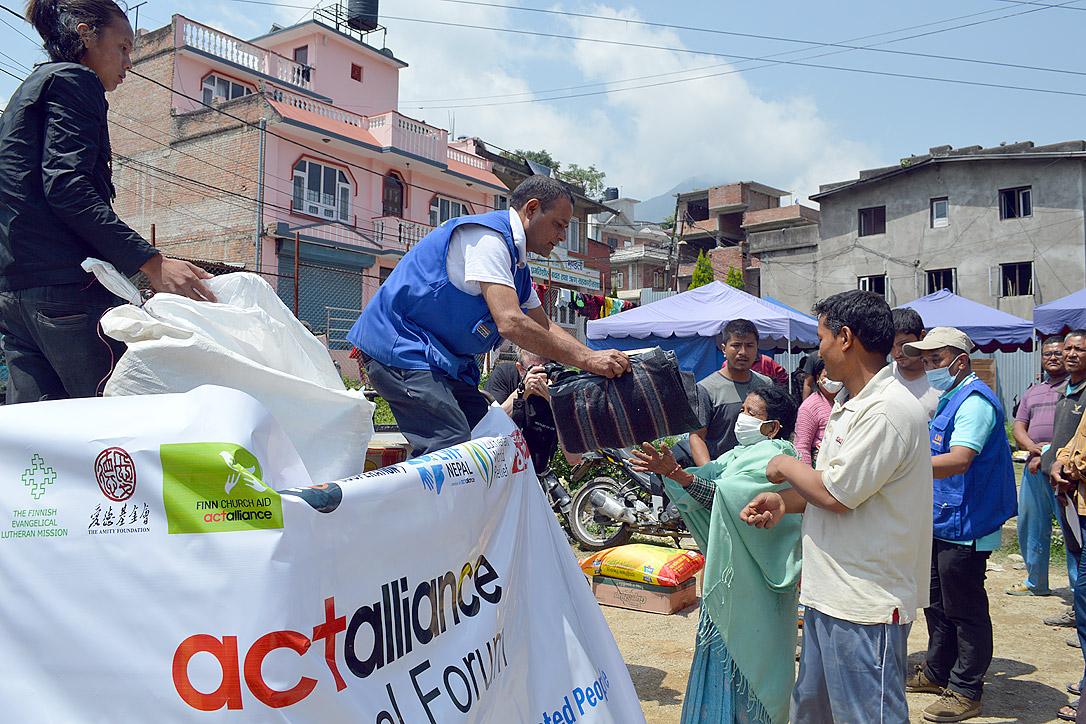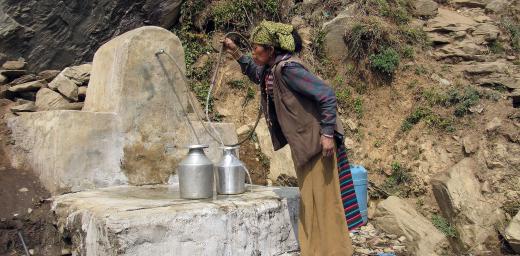LWF and Islamic Relief partner in Nepal earthquake response

Relief efforts in Nepal. Photo: LWF/DWS Nepal
Christian and Muslim humanitarian organizations provide relief for marginalized groups
(LWI) – The Lutheran World Federation (LWF) and Islamic Relief Worldwide (IRW) have joined forces to provide shelter for 12,000 of the most vulnerable and marginalized people in the 14 worst-affected areas following the earthquakes in Nepal in April.
This joint relief project will ensure that 12,000 people in five remote villages in Rasuwa district, north-east of Kathmandu will receive temporary homes before the onset of the monsoon and the following cold winter seasons.
Following a joint assessment, the project will target those most in need, including people with disabilities, the elderly, women, children, nursing mothers, and people from marginalized communities such as Dalits, religious minorities and indigenous nationalities.
Religion an “added value in emergency aid”
“In Nepal, it is absolutely vital that we target aid towards those who need it most,” said Dr Mohamed Ashmawey, CEO of Islamic Relief Worldwide. “Islamic Relief has vast experience in humanitarian work and has responded to disasters in the Philippines, Pakistan, and Indonesia, amongst other locations. We look forward to working with LWF, sharing expertise and serving communities in Nepal.”
The LWF has been working with marginalized communities and on disaster response in Nepal for 30 years and IRW wishes to collaborate with the LWF, accessing the LWF’s existing experience on the ground and sharing the diversity of our experience in responding to disasters across the world.
The LWF and IRW have separately provided assistance to more than 110,000 Nepalese people, and hope to reach even more by combining resources.
“This is a time when we as faith-based organizations have to say very clearly that religion is not a stumbling block, but an added value in emergency aid,” said LWF General Secretary Rev. Martin Junge. “In Nepal, we have a coexistence of many different beliefs. When disaster strikes, communities have to pull together to help the most vulnerable,” Junge added.
In August 2014, IRW and the LWF signed a Memorandum of Understanding to collaborate on humanitarian work, marking the first official cooperation between a global Christian communion and a worldwide Islamic non-governmental organization.
The joint Nepal earthquake emergency response will be the third cooperative project for IRW and the LWF. The two organizations have been working together with Syrian refugees and host communities in Al Mafraq in Jordan, and plan a project in the Kenyan refugee camp Dadaab.
Help to marginalized people
IRW and the LWF said they were confident that with this new initiative, additional numbers of marginalized people affected by the quake would get relief and early-recovery support in an economic, efficient, transparent and accountable manner.
Dr Prabin Manandhar of LWF Nepal noted: “With this agreement between IRW and the LWF, we shall be in a better position to reach out to the people affected by the April 25 earthquake. The partnership will enable us to widen and deepen our relief and early-recovery programs in the affected districts and foster interfaith harmony simultaneously.”
Umair Hasan, head of mission in Nepal for IRW, said: “An estimated 8 million people have been affected by the disaster in Nepal, and IRW and LWF are keen to reach some of those people in the remotest and marginalized areas of Rasuwa District, offering support to communities who have lost family members, homes and livelihoods. By combining our expertise, we will be able to provide much needed assistance in these ‘hard to reach areas’.”




